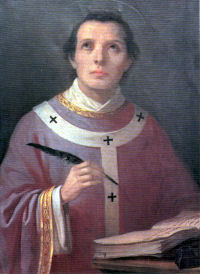Optional Memorial of St. Anselm, bishop & doctor Old Calendar: St. Anselm
St. Anselm
As prior and abbot, Anselm made the Benedictine monastery of Bec the center of a true reformation in Normandy and England. From this monastery he exercised a restraining influence on popes, kings, the worldly great, and entire religious orders. Raised to the dignity of Archbishop of Canterbury and primate of England, he waged a heroic campaign in defense of the rights and liberties of the Church. As a result he was deprived of goods and position and finally banned from the country. He journeyed to Rome, and at the Council of Bari supported Pope Urban II against the errors of the Greeks. His writings bear eloquent testimony to his moral stature and learning, and have earned for him the title of "Father of Scholasticism."— The Church's Year of Grace, Pius Parsch
 St. Anselm exhibited remarkable versatility in his life; a combination of contemplation, prayer, study, writing, and external activity. This was partly the result of the extraordinary talent that God gave him, but it was likewise the fruit of Anselm's faithful exercise of his talent in the study of natural and supernatural truths. But his chief merit lay in his earnest, conscious effort to live in accordance with what he had learned from the study of divine truths. By this means he was able to ascend to the heights of a life of faith and union with God. There is very much that we can learn from this great teacher. "Lord, I do not presume to fathom the depths of your truths, for my understanding is not equal to the task. Nevertheless, I desire to learn Your truths in some measure—those truths that I believe and love. I do not seek to gain knowledge so that I can believe; rather, I believe so that I may gain knowledge. No matter how persistently my soul gazes, it still beholds nothing of Your beauty; my soul listens intently, and yet it hears nothing of the learning of Your Being; my soul wants to breathe in Your fragrance, and yet perceives none of it. What are You, Lord? Under what image can my heart recognize You? Truly, You are life; You are truth; You are Goodness; You are Holiness; You are eternity; You are everything good! O man, why do you roam about so far in search of good things for soul and body? Love the one Good, in whom all goods are contained, and that will satisfy you!" (St. Anselm.)
St. Anselm exhibited remarkable versatility in his life; a combination of contemplation, prayer, study, writing, and external activity. This was partly the result of the extraordinary talent that God gave him, but it was likewise the fruit of Anselm's faithful exercise of his talent in the study of natural and supernatural truths. But his chief merit lay in his earnest, conscious effort to live in accordance with what he had learned from the study of divine truths. By this means he was able to ascend to the heights of a life of faith and union with God. There is very much that we can learn from this great teacher. "Lord, I do not presume to fathom the depths of your truths, for my understanding is not equal to the task. Nevertheless, I desire to learn Your truths in some measure—those truths that I believe and love. I do not seek to gain knowledge so that I can believe; rather, I believe so that I may gain knowledge. No matter how persistently my soul gazes, it still beholds nothing of Your beauty; my soul listens intently, and yet it hears nothing of the learning of Your Being; my soul wants to breathe in Your fragrance, and yet perceives none of it. What are You, Lord? Under what image can my heart recognize You? Truly, You are life; You are truth; You are Goodness; You are Holiness; You are eternity; You are everything good! O man, why do you roam about so far in search of good things for soul and body? Love the one Good, in whom all goods are contained, and that will satisfy you!" (St. Anselm.) Symbols: Benedictine monk admonishing an evildoer; archbishop; ship; with Our Lady appearing before him; with a ship.
Feast Day: April 21
No comments:
Post a Comment